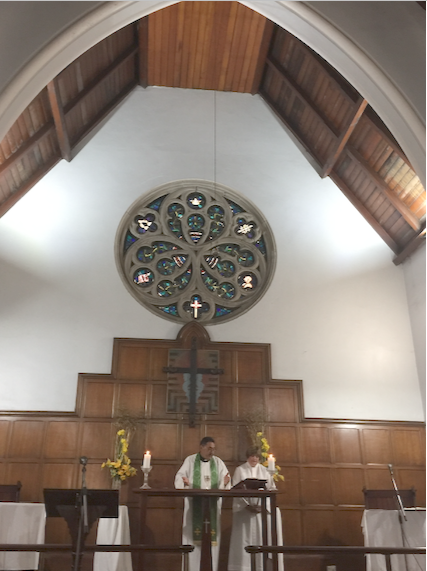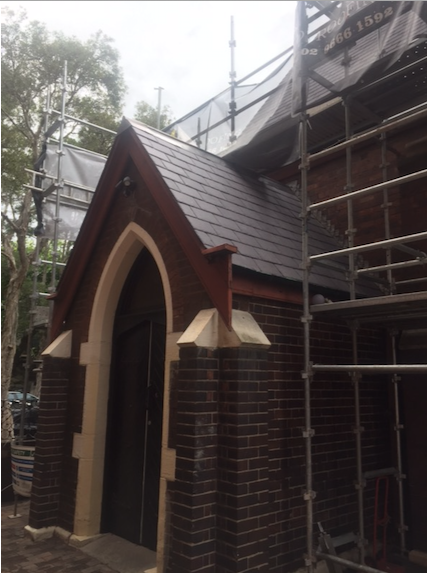
Readings:
Deuteronomy 18:15-20
Psalm 111
1 Corinthians 8:1-13
Mark 1:21-28
Sentence:
25But Jesus rebuked him, saying, ‘Be silent, and come out of him!’ Mark 1:25
Collect:
Holy One of God, as healer and teacher of the faith, your words astound, and transform the lives of many. May we teach your word and be bold in our actions so that your presence will be revealed. For you are alive and reign with the Father in the unity of the Holy Spirit, one God, now and forever. Amen
Mark 1:21-28
The Man with an Unclean Spirit
They went to Capernaum; and when the sabbath came, he entered the synagogue and taught. 22They were astounded at his teaching, for he taught them as one having authority, and not as the scribes. 23Just then there was in their synagogue a man with an unclean spirit, 24and he cried out, ‘What have you to do with us, Jesus of Nazareth? Have you come to destroy us? I know who you are, the Holy One of God.’ 25But Jesus rebuked him, saying, ‘Be silent, and come out of him!’ 26And the unclean spirit, throwing him into convulsions and crying with a loud voice, came out of him. 27They were all amazed, and they kept on asking one another, ‘What is this? A new teaching—with authority! He commands even the unclean spirits, and they obey him.’ 28At once his fame began to spread throughout the surrounding region of Galilee.
Tena koutou katoa e te whanau o Te Wairua Tapu.
Well whanau, the man with an unclean spirit is probably the most intriguing part of today’s gospel.
Who is this man with an unclean spirit that shows up in the synagogue? He’s loud. He interrupts. And he draws our attention the way an un-showered, talking to himself, homeless man would catch our attention if he showed up at Te Wairua Tapu.
However, he doesn’t have that effect on the people in the synagogue. Their attention is clearly on Jesus. They are amazed by his presence and his teaching. It’s like nothing they have ever heard before. He speaks with authority. His words mean something and they make a difference. Even the man with an unclean spirit is shocked and intrigued by Jesus. “What have you to do with us, Jesus of Nazareth? Have you come to destroy us?”
Jesus is teaching them and his authority fills not just the place but each person that is there. While this is happening, immediately this man with an unclean spirit shows up. The presence of Jesus, the one with a ‘clean-spirit’ draws out the presence of the man with an ‘unclean spirit’. Jesus has that effect on people, especially those who listen. His authority and teaching reveal the truth about his listeners’ lives.
The one with the unclean spirit is an image of what the lives of those in the synagogue actually look like. His uncleanness is not about personal hygiene, immorality, being bad or being over religious. Instead, his presence “in their synagogue” describes the problems of their soul, their fragmented and dysfunctional lives, and the many voices within them. In looking at him they see themselves and they are astounded by the contrast of the one who has a clean-spirit.
“What have you to do with us, Jesus of Nazareth?” The man senses the distance between his life and Jesus’. His words betray his isolation. However, it’s not just about him. He speaks not only for himself but for all those in the synagogue that day. He represents every one who has ever experienced the brokenness of life and for all who feel disconnected from themselves, others or God. In other words, he represents the human condition. Behind his question is the unspoken longing and hope that Jesus would say, “Everything I have is to do with you.” Those are the words that can begin to put his life back together.
We’re not so different. Each one of us also longs for that answer because we too know the separation and brokenness of our own lives. We’ve lived in isolation. We have been trapped in grief. And we have carried the burden of guilt. The truth of those situations often reveals itself in the many personas we wear. At some level we all project various personas or images of how we want others to see us and how we want to see ourselves. Sometimes it’s as simple as saying, “I can’t go to the shops looking like this. I haven’t had a shave and my hair is a mess.” Or we smile and say, “Yeah, I’m good,” and quickly change the subject when the truth is we are hanging on by a thread and not sure how we’ll get through the rest of the day. We don’t want our life to be seen in it’s unmade-up condition.
You see, we use our personas as masks to hide the truth of what our life is like and who we are. The tragedy is that they also hide who we might become. It seems that those masks most often arise from the many voices that live within us. They are the voices of low self esteem, guilt, grief, fear, anger and judgment. They are the voices that keep us in constant comparison and competition with others. They are voices that demand perfectionism, asking, “What have you done for me today?” The voices are never satisfied. We are never able to do or be enough. Every one of those is a false voice, the voice of the unclean spirit that separates us from our authentic self, from all that we love and all who love us.
The reality of it all, is that deep down we long for intimacy and authenticity but the last thing we want is to be found out, to have someone see us for who we truly are and who we are not. We don’t want to drop our guard so we put on a good front hoping that will gain us approval, acceptance and love. We say the right things, act the right way, dress and behave a certain way, even believe the right way, and all the while we are creating ourselves in the image and likeness of the unclean spirit. The problem is that those personas we put up, keep us from having the very things we think they will gain us; things like intimacy, love, acceptance, healing, forgiveness and authenticity. The personas offer no possibility for life to flourish and be abundant. Still we hold on to those false voices, voices that collectively ask, “Have you come to destroy us?”
That is exactly what Jesus has come for. He has come to destroy. He silences our false voices. He casts out all our personas and makes us people with a clean spirit. He has everything to do with us. He stands before us as the mirror image of who we can become. There is no aspect of our life about which he is not concerned. He calls us into our true self, the one made in the image and likeness of God. He calls us back into the beauty and wholeness of our original creation. Today’s gospel is as much about calling forth as it is about casting out.
The true voice and the true image are always present. That’s why the man with an unclean spirit can cry out, “I know who you are, the Holy One of God.” He speaks from a deep place of knowing. His recognition of Jesus is at a profound level a recognition of himself and his own holiness. For every voice that denies that and leaves us crying, “What have you do to with us?” Jesus says, “Shhh. Be quiet. That’s not who you are. You are mine and I have everything to do with you.” Listen to that voice and you too will be amazed and astounded at what can become of your life. Amen
Archdeacon Kaio Karipa
The Venerable Kaio Karipa
Chaplain
The Sydney Maori Anglican Fellowship Church of Te Wairua Tapu
www.tewairuatapu.com.au
Photo: Jan 2020










